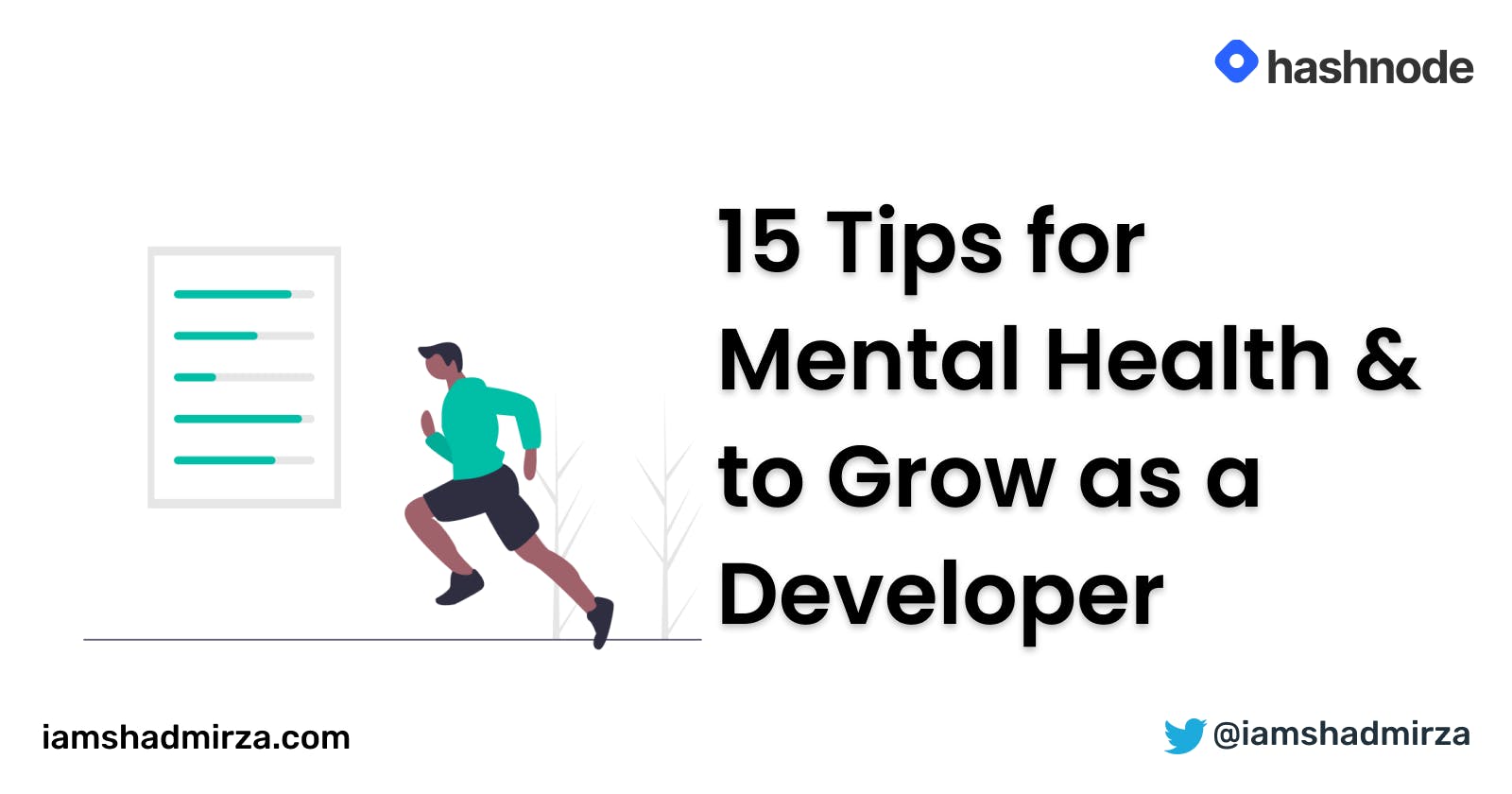Hello everyone, I will be sharing some tips that have helped me in the past to grow as a developer and keep my stress level low. I usually try to do a lot in a limited amount of time and often feel overwhelmed. These are the things that I have tried and found helpful.
1. When There Is Too Much On The Plate, Grab A Bowl
This is my personal favorite because I find myself juggling work, blogging, drawing, coding tutorials, and other stuff more often than not. This has been a savior so far.
This means that when you find yourself overwhelmed by the items you have on your plate to finish, take a bowl, get one thing from the container, put it in the bowl, and start eating.
Don't think about how much you have on the plate left. Just try to finish up the bowl as soon as possible and then grab another item.
If you're wondering who wrote this quote, it's not a quote. I just made that up.
2. The 15 Minute Rule
Try any problematic task for 15 minutes before asking or seeking help. This will build your mind-muscle to search for answers instead of depending on others. The more we force our brain to do, the more we get better 💪.
3. Single Point Of Focus
You should focus on one and only one thing at a time. Just forget that there is anything in the world that matters except the task at hand. Our minds are more suited to focus on one thing. Avoid distractions as much as you can and provide your undivided attention to what you're working on.
4. Work Is Sacred, Treat It Like That
Work should be sacred and free from distractions. Isolation is the key to build focus. Use a separate room or soft music to mute the world. Don't eat where you work and vice versa. Have a particular place associated with your work hour and treat it like that.
It specifically helps when you're working from home. You have a dedicated desk at work, and your mind instantly switches to work mode as soon as you reach the office. This is something not available at home but can be created easily. If you have a desk, use it only when you're going to work and not for eating or other stuff. Otherwise, you can use something only while working. Your brain will associate that thing with a cue to switch into work mode. My cheaper go to stuff was a headphone (even when I am not listening to anything) and a bed table.
5. Do One Activity For A Prolonged Duration To Build Focus
Activities like Reading and Listening to podcasts/audiobooks for a long duration, like 40-50 minutes, enhances your willpower and focus. Do not touch your phone, do or think anything while you're doing that and keep a keen focus on the activity you're up to.
You will often get distracted and start thinking about a completely different thing but bring your focus back to the activity and continue. This bring your focus back part is how you practice focus. Being focused is a skill that can be built with practice. This is similar to what a person does while meditating.
6. Wakeup Without Alarm
Our sleep consists of cycles. Usually, 4, 5, 6, 7, 8 cycles are okay as long as they are complete, but 4½, 5⅔, or 8⅝ is not good. The appropriate number of cycles should be complete to heal your body, which depends on the day you just had. A stressful day demands a longer duration of sleep.
When you wake up with an alarm, you disrupt that cycle, resulting in you feeling tired. When you press the snooze button and sleep again, a new cycle gets started. This will eventually break again in 15 minutes, and you will end up even more tired after sleeping an ample amount of time. Trust your body. It will wake you up when your body is ready to wake up. Check out this link to know when you should sleep so that your cycle doesn't break: https://sleepyti.me/
7. Rituals Over Willpower
Following rituals is a fantastic way to build your willpower. Things like making your bed when you wake up, reading 25 pages daily, waking up and sleeping at the same time every single day. This helps your mind to stay organized and not think a lot about it. Rituals make your daily tasks self-organized, and these tasks require a significantly less amount of brainpower. This gives your brain enough space to think about important stuff like work or creative ideas.
Start with something small and stack the activities in one order. I will tell you how my daily rituals look like:
Wakeup > Brush > Tea > 15 min walk > Read 25 pages > Check Phone > Bath > Open laptop > write tasks of the day.
I learned this from the book Atomic Habits by James Clear
8. The 5-Minute Rule
Our brain generates pain-like signals when we try to do a difficult task that can be avoided, and that's how procrastination happens. Your brain starts looking for other activities which instead give pleasure to prevent this pain. Thus, You end up watching a video on "How to talk to turtle" after hours of surfing on Youtube (guilty 😓). But here is a trick. After a few minutes of you doing that task you were desperately trying to avoid, this pain signal disappears.
So what I use to trick my brain is I tell myself that I'm going to do this for 5 minutes, and then I'll get up. I call this "5-minute rule" because I'm bad at naming things. You start doing work, and after 5 minutes, that pain signal is gone, and you end up spending more time than you decided. It works like a charm, and you should try this out.
Feel free to suggest a better name for this rule in the comments.
9. Multi-Tasking Is A Myth
Context switching is hard. It takes a lot of brain resources and only comes after enormous practice. It's better to focus on one thing at a time. This efficiently uses your brain's full power, almost like a high-intensity laser pointed out a single point. I have written a detailed article on this topic.
10. Exercise Daily (even little counts)
I'm not saying to build having muscles, but it's good to do a mild workout daily. Walking fast does come into mild exercise, by the way. It fills the blood with a lot of oxygen and sends it to every corner of your body. It increases heart rate, which pumps more oxygen to the brain.
Not to forget, this is essential for your brain to receive fresh, oxygenated blood for working correctly. Exercise also promotes brain plasticity by stimulating new connections between cells in many important cortical areas of the brain.
11. Join A Community
Being among creative thinkers encourages your creativity. Having other like-minded people around you boosts your morale and helps you improve in all sorts of fields. That's why being a part of the community is very important if you want to grow as a developer. Use Twitter and LinkedIn to find a community and share knowledge.
12. Food For Thoughts
Whatever goes in comes out. It's as simple as that. That's why food for thoughts is essential. Start your day by listening to a good podcast, a TED talk, or read a book. Even 10 minutes are enough. Listen to somethings that impart wisdom you didn't know before. Listen to people who have a diverse perspective on how they see the world. Take whatever good is there in the world.
13. Shutdown Ritual
This is something I read in the book Deep Work by Cal Newport. Decide a time when you're going to shut down your work stuff and free up your mind. Extend the day if needed but never go to bed thinking about work and stressing over it.
What if something is incomplete? Write down your progress and what you're going to do when you get back to work next time. This will help your brain stop worrying about work too much and reduces stress. Rest is equally important as work. Read more in this article
14. Reward Hours
This is something I learned from Sid. Reward Hour is something that you look for, and you enjoy it. I place my reward hour just after the Shutdown Ritual. This makes me focus more on the task so that I can finish it before that time. Do something that you really love to reward yourself for all the hard work you have accomplished.
15. Mind Dump
This is something I learned from Swapnil Agarwal. When you have too much going on inside your mind, and it feels like you can't follow up. Just sit down with a pen and paper and write everything down. This will declutter your thoughts, and you will be able to reflect on them.
Read this guide to learn how to do a brain dump.
The problem with most of the productivity guides is, they will tell you what to do but not how to do it. However, I can't guarantee that these strategies will surely help you. But I will suggest you try and see what works for you. That's it for now. Take care and stay safe. Shad
Illustration on the cover is courtesy of unDraw

